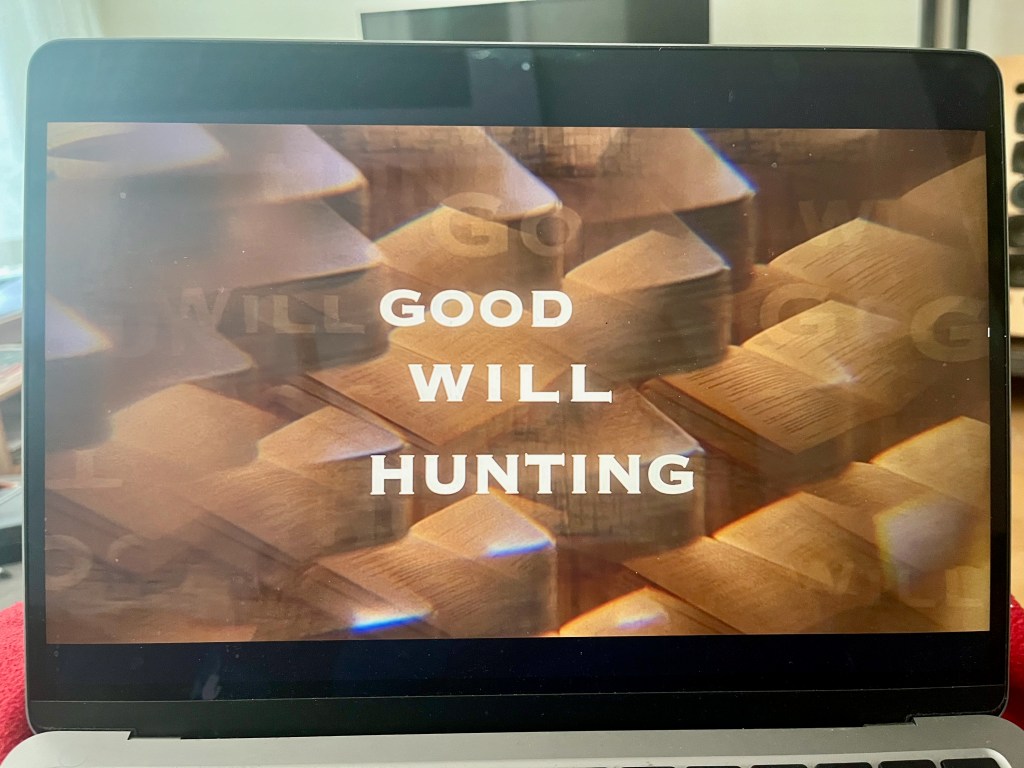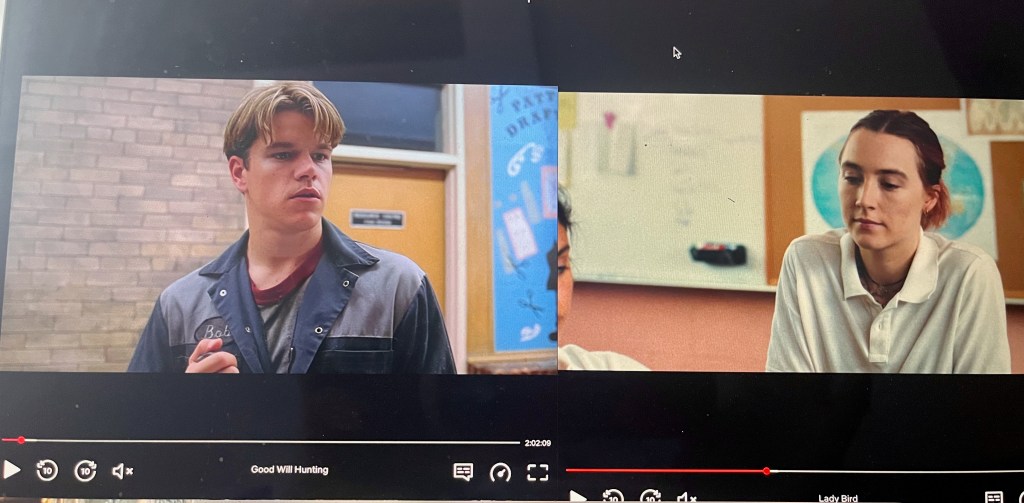Last week, my boyfriend and I watched two films in one night: Lady Bird and Good Will Hunting. A (relatively) new and an older one. One of them we hadn’t seen before, but the other we knew quite well. And guess what? Both are about the same topic, but deal with it in completely different ways – partly because one of the features a female and the other a male protagonist. Now, almost a week later, we still haven’t finished talking about it. Want to know which elements we keep coming back to? Read on!
Elke: I can’t believe how similar Lady Bird and Good Will Hunting are! They are both about adolescents who aren’t comfortable with the life they’re living and are looking for a way out of it. Lady Bird is about Christine – who calls herself Lady Bird because she doesn’t like the name her parents gave her – a girl from a poor family with a dreadful mother and a depressed father, who is looking for love and a university far away from her home town Sacramento.
Ynze: Good Will Hunting is about Will, an immensely intelligent orphan from the poor part of Boston, who keeps getting into fight and works at Harvard as a cleaner. A maths professor happens to discover his talents and decides to help him, provided that he accepts help from a therapist.
Elke: Hmm, if you describe it like that, they’re not similar at all. Apart from the fact that the main characters are both young and feel alienated from their surroundings.

Ynze: And Lady Bird and Will are both rebellious. And they suffered or have suffered at home. And they both want to leave.
Elke: Yes, you’re right! And I loved both films! Especially Lady Bird completely took me by surprise, because I hadn’t seen that one before. But I was moved by Good Will Hunting, as well.
Ynze: I liked Lady Bird too, but I preferred Good Will Hunting. I think that’s because I was much more able to empathise with Will.
Elke: How come?
Ynze: I think that’s because of its silly sense of humour and childish jokes, senseless fights and other cocky masculine behaviour. I was really enjoying that, and then I realised that I missed that aspect in Lady Bird.
Elke: Yes, we women don’t behave like that. But I thought Lady Bird was very funny, too. Lady Bird loves pranks, and I liked that scene when she bought all sorts of ‘grown-up stuff’ on her eighteenth birthday, because she was finally allowed to. I kept laughing out loud watching this film.
Ynze: It was quite funny, but I was unable to really empathise with her.
Elke: Is that because she’s a woman?
Ynze: I’m not quite sure. I did feel more distance between Lady Bird and me and Will and me, because I feel like I truly understand Will’s decisions, even though I’m not like him at all.
Elke: Is that because he’s a man?
Ynze: I hated Lady Bird’s mother, and her character got to me much more than Lady Bird herself. I can imagine what she’s going through and why she does things the way she does, but she does it in such a thoroughly different way than I would have done. Will, his problems, and his friends simply make more sense to me.
Elke: Funny, to me it was the other way around. I completely understood why she did things and made certain choices. That feeling you describe is how I felt while watching Good Will Hunting. To me he was simply one of those teenagers who refuse to show any weaknesses and therefore jokes around. I really wanted to punch him at times.
Ynze: Is that because he’s a man?

Elke: Are you insinuating I want to go around punching men? No, I don’t mean that. To me, Lady Bird was much more subtle than Good Will Hunting, because the latter goes through great lengths explaining what’s going on. There are whole scenes when the relationship between Will and his friends is explained, and what they’re feeling and thinking. Lady Bird never tells us what exactly is going on, making us guess as to what their real feelings are. It was much more interesting to me.
Ynze: Is that because she is a woman?
Elke: Yes, I think so. I loved the scenes where Lady Bird buys a dress with her mother and when she returns to her actual best friend Julie, after she’s realised her boyfriend and new friend turn out to be boring and pretentious.
Ynze: Yes, but it was so obvious that Lady Bird would go to Prom with Julie. There’s so much emphasis on that dress, her mother taking it in, and then her sitting in her dress with her family, and the boyfriend who doesn’t even bother coming to the door – c’mon. I mean, they didn’t say exactly what was going on, but they kind of spelled it out anyway. I much prefer those four guys who keep teasing each other but still love each other and also ask how Skylar, Will’s girlfriend is. That’s so much clearer and more to the point.
Elke: Does it always have to be clear?
Ynze: Yes, that way you know what you can expect. That’s important.
Elke: Is that because you’re a man?
Ynze: Perhaps. There is more communication in Good Will Hunting. I like that. Lady Bird’s mother frustrates me to no end, because she only communicates indirectly. She says one thing and means another, and she keeps blaming Lady Bird for everything. We only know what Lady Bird is feeling only becomes apparent by what she’s doing, I have to deduce her emotions by her actions. I prefer Will’s ability to answer every serious question with a bad joke.
Elke: Oh no, those jokes. That’s such a male thing to do. Please just say how you’re feeling.
Ynze: Another example is when Lady Bird decides to become friends with the most popular girl in school, thus betraying her best friend. Will would never to that. He dumps Skylar when she is getting too close, but he’s quite clear about that. He runs away from a real connection – that’s it, and it he makes it very clear. Lady Bird dumps her best friend without even letting her know. I would never ever do that, and I can’t empathise with it at all. I know people do that, but Will’s behaviour makes so much more sense to me.
Elke: Do you think he’s transparent about all of it? I wholeheartedly disagree. He says he doesn’t love her but he does, and he just breaks it off. Only because he is unable to open up to someone. I really hate that kind of behaviour.
Ynze: Is that because you’re a woman?

Elke: Probably. It’s funny, isn’t it, how in the it comes down to male and female behaviour and whether we’re able to empathise with it.
Ynze: So this is another one of those feminist posts?
Elke: Obviously, what did you expect? Or did I have to be clearer about that? What really impressed me about Lady Bird is that it subtly shows how strong Lady Bird is. She chooses her own future, she picks her own friends – and returns to her old one when she realises the new ones are stupid – she decides when to have sex but doesn’t allow it to identify who she is, and of course she gives herself a new name. Lady Bird is about the protagonist’s relationship with her best friend, her mother, and of course with herself. And yes, she does leave for New York the first chance she has, but does tell her mother she loves her, and decides to go back to being called Christine. She stays true to herself much more than Will.
Ynze: Will stays true to himself, too, doesn’t he? And he does leave, but he will definitely visit his friends again.
Elke: No, the difference is that he’s dependent on other people – men, in this case. And finally, he chooses the girl, he even gives up a good job for her. And no, he will never return to his friends. That’s the point: he has to leave in order to find out who he truly is.
Ynze: Yes, but that’s romantic, isn’t it? Finally there’s a man who chooses for his girlfriend, and you find something to complain about! And no. You really don’t get it. Those friends are his friends forever, and he will return.
(We still haven’t agreed on this particular element: Ynze really thinks they’re such good friends that Will will return, but Elke is convinced he’ll never go back to Boston.)
Elke: I see what you mean. But it’s about how Will, contrary to Lady Bird, still doesn’t make his own decisions. Although I really do like the part when Will finally breaks down.
Ynze: Is that because he’s a man?

Elke: Yes, because they’re not supposed to cry, are they? And this film shows that it’s fine if they do, thus eliminating the stereotype that men shouldn’t have any feelings.
Ynze: See, it’s a beautiful film.
Elke: I never said it wasn’t! I just don’t like it that there’s only one female character in it, and she’s the love interest.
Ynze: That’s not the point. Both films are about making (conscious) decisions. Our personalities decide what we want to do. Our choices make clear who we are, which is important to us. Making good choices demand courage. Christine and Will both make tough decisions. Heroes are brave. Heroes dare making big decisions, to boldly go where no (wo)man has gone before.
Elke: And who is the biggest hero, in your opinion?
Ynze: After an admittedly fairly long time: Will.
Elke: To me it’s Lady Bird.
Ynze: Is that because we’re a man and a woman?
Elke: I’m afraid so. Some things apparently never change. Here’s an idea: how about we watch these films again in ten years time, when men and women and everything in between are truly equal and the same, and see if we still feel the same way?
Ynze: Let’s.
Elke, addressing you, the reader: What did you think of Lady Bird and Good Will Hunting? Di you think there are similarities between these two films? Is one of them a ‘female’ film and the other a ‘male’ one, or can you find universal themes in them as well? Are you more able to empathise with men or women, or doesn’t it matter to you? Do you think the film world lacks non-binary characters, or issues that aren’t gender specific? What’s your favourite feminist film? As you can see, these films really inspired us, and there are so many questions and issues we haven’t even addressed. Please share your opinion in the comments, and don’t forget to follow me for more posts – usually bookish ones, but I might make more exceptions like this one!





